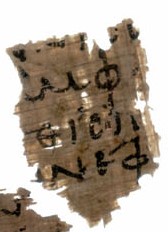Fragment 8
].ν. ο̣ .[
] α̣μφ.[
Ἄ]τθι σο.[
4. ]. νέφ[
] [
1
Leave a comment on paragraph 1 0
 Sappho 8 (P. Oxy. 2289 fr. 3)
Sappho 8 (P. Oxy. 2289 fr. 3)
Page 12

1
Leave a comment on paragraph 1 0
 Sappho 8 (P. Oxy. 2289 fr. 3)
Sappho 8 (P. Oxy. 2289 fr. 3)
Source: https://digitalsappho.org/fragments/fr8/
Comments
Book I
Meter: Sapphic Stanzas
– ᴗ – × | – ᴗ ᴗ – | ᴗ – ×
– ᴗ – × | – ᴗ ᴗ – | ᴗ – ×
– ᴗ – × | – ᴗ ᴗ – | ᴗ – ×
– ᴗ ᴗ – ×
Text: Voigt, Eva-Maria, ed. 1971. Sappho et Alcaeus. Amsterdam: Polak & Van Gennep.
Source: P. Oxy. 2289 fr. 3
See an image of P. Oxy. 2289 at the Oxyrhynchus Online Image Database.
Testimonia
Suda, Sappho (Σ 107) (Campbell, Testimony #2)
ἑταῖραι δὲ αὐτῆς καὶ φίλαι γεγόνασι τρεῖς, Ἀτθίς, Τελεσίππα, Μεγάρα· πρὸς ἅς καὶ διαβολὴν ἔσχεν αἰσχρᾶς φιλίας.
"She [Sappho] had three companions and friends, Atthis, Telesippa and Megara, and she got a bad name for her impure friendship with them." (trans. Campbell 4-7)
Ovid, Heroides 15.15-20, 200-201 (Campbell Testimony #19)
nec me Pyrrhiades Methymniadesve puellae | nec me Lesbiadum cetera turba iuvant | vilis Anactorie, vilis mihi candida Cydro, | non oculis grata est Atthis ut ante meis | atque aliae centum quas non sine crimine amavi. | improbe, multarum quod fuit, unus habes!
...
Lesbides, infamem quae me fecistis amatae, | desinite ad citharas turba venire meas!
Neither the girls of Pyrrha or Methymna delight me, nor the rest of the throng of Lesbian women. Naught to me is Anactoria, naught the fair Cydro; Atthis is not pleasing, as before, to my eyes, nor a hundred others whom I have loved, not without reproach. Shameless man, what once belonged to many girls is yours alone! ... Women of Lesbos, whose love has made me infamous, throng no more to hear my lyre! (trans. Campbell 18-21)
Maximus of Tyre, Orations 18.9 (Campbell Testimony #20)
ὁ δὲ τῆς Λεσβίας (sc. ἔρως) . . . τί ἂν εἴη ἄλλο ἢ αυτό, ἡ Σωκράτους τέχνη ἐρωτική; δοκοῦσι γὰρ μοι τὴν καθ’ αὑτὸν ἑκάτερος φιλίαν, ἡ μέν γυναικῶν, ὁ δὲ ἀρρένων, ἐπιτηδεῦσαι. καὶ γὰρ πολλῶν ἐρᾶν ἔλεγον καὶ ὑπὸ πάντων ἁλίσκεσθαι τῶν καλῶν· ὅ τι γὰρ ἐκείνῳ Ἀλκιβιάδης καὶ Χαρμίδης καὶ Φαῖδρος, τοῦτο τῇ Λεσβίᾳ Γυρίννα καὶ Ἀτθὶς καὶ Ἀνακτορία· καὶ ὅ τι περ Σωκράτει οἱ ἀντίτεχνοι Πρόδικος καὶ Γοργίας καὶ Θρασύμαχος καὶ Πρωταγόρας, τοῦτο τῇ Σαπφοῖ Γοργὼ καὶ Ἀνδρομέδα· νῦν μὲν ἐπιτιμᾷ ταύταις, νῦν δὲ ἐλέγχει καὶ εἰρωνεύεται αὐτὰ ἐκεῖνα τὰ Σωκράτους.
What else could one call the love of the Lesbian woman than the Socratic art of love? For they seem to me to have practiced love after their own fashion, she the love women, he of men. For they said they loved many, and were captivated by all things beautiful. What Alcibiades and Charmides and Phaedrus were to him, Gyrinna and Atthis and Anactoria were to her; what the rival craftsmen Prodicus and Georgias and Thrasymachus and Protagoras were to Socrates, Gorgo and Andromeda were to Sappho. Sometimes she censures them, at other times she cross-examines them, and she uses irony just like Socrates. (trans. Campbell 20-21).1